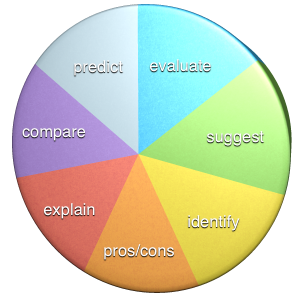 You probably know that the third part of IELTS Speaking is a discussion of abstract topics connected with Part 2. At first, some students have no clue what they can say during 45 seconds, so uncomfortable lapses of silence occur.
You probably know that the third part of IELTS Speaking is a discussion of abstract topics connected with Part 2. At first, some students have no clue what they can say during 45 seconds, so uncomfortable lapses of silence occur.
1. Silence is not an option
This is the first thing you need to understand. If you keep silent even for 5-7 seconds, you lose your fluency. One way to avoid this is to use fillers that give you some seconds to think.
The best strategy is to talk and let the examiner take care of timing. Just do your best to speak, speak, speak and then stop speaking when you see that examiner is about to ask the next question. You can practice doing so on this page, there are 30 speaking practices with special pauses for your answers.
2. Don’t speak if the examiner is speaking
Some students have an opposite issue – they can’t stop speaking and want to finish by all means even if the examiner has already started asking the next question. It’s quite dangerous, not only because it can annoy the examiner, but also because you can miss the next question altogether.
It’s absolutely ok if you were interrupted in mid-sentence, just forget everything you wanted to say and direct 100% of your attention to the next question.
3. Difficult questions are a good sign
In IELTS Speaking part 3, the examiner doesn’t have precise questions, just some ideas about the topic. They will formulate the questions adjusting the level of difficulty. E.g., if they see that a student is about 4-5, questions will sound simpler than those for 7+ students. Therefore, if you hear “difficult question”, the examiner may think that you are fighting for a higher band. Just stay confident and answer the best way you can.
4. Understand the purpose of each question
The exam gives you plenty of chances to show off. You will be asked questions with different “functions”, such as “evaluate”, “identify”, “suggest”, “predict”. The key thing is to understand the function before you start answering and then use “cohesive devices” relevant to your question. That will help you to structure your answer and to get more points for Fluency and coherence.
Here you can see some examples of questions and their purpose
evaluate (give opinion)
Let’s talk about credit cards. Do you think it’s safe to use credit cards?
If we talk about advertising in general, what do you think about advertisements?
suggest
In your opinion, what are some ways in which the government could protect consumers from unethical advertising?
How could recycling be promoted nowadays?
identify
Do you think there can be any issues associated with the quality of goods people buy online?
What types of materials can be recycled?
give pros/cons (advantages/disadvantages)
What are the benefits and drawbacks of shopping in a large department store?
What do you think are the pros and cons of recycling?
explain
Why did people in developed countries start recycling?
Why do you think more people are buying goods online nowadays?
compare
What are the differences (and similarities) between buying something in a department store and buying something online?
Can you compare advertisements on TV and those in magazines?
Do men and women read the same types of magazines?
predict
Do you think more people will buy products online in the future?
Will online education replace teachers one day?
Now you can take the quiz to check your understanding
What is the function of this question?
[WpProQuiz 48] Русский
Русский English
English



